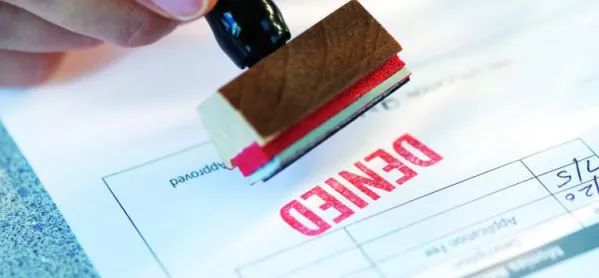
- Home
- GCSE results day: If exam appeals are restricted, how can we trust the grades?
GCSE results day: If exam appeals are restricted, how can we trust the grades?

At this stage of the exams cycle, it’s inevitable that articles will start appearing in the education press about the accuracy of marking and inequalities in the reviews and appeals system, even though Ofqual only updated it in 2017.
Ofqual’s stated aim was to stop the system from being overloaded by what Ofqual saw as the tendency by some schools and colleges to launch speculative challenges - what one Ofqual official called “a second bite of the cherry”. Its research had shown increasing numbers of requests for reviews flooding the system. The regulator had interpreted these challenges as attempts by the candidate who is just one or two marks below the grade boundary to secure an upgrade, thus advantaging wealthier candidates.
In an effort to limit this tactic, Ofqual decreed that where there is just a “difference of opinion” and the mark is within a tolerance of 1 or 2 marks then the original mark should stand. Reviewing examiners must show that a “marking error” has been made and supply a reason for their decision, which will be made available to the candidate. The effect of this increased scrutiny could well be to limit mark increases and make the reviewing examiners take the line of least resistance by confirming the original mark.
It would take a brave and confident reviewer to do anything other, especially following AQA’s reprimand from Ofqual about the conduct of its review of English language GCSE last summer. An example has been set to boards, reviewers, teachers and students.
What Ofqual left to the boards was the decision about how much to charge for reviews and associated services. The incoming chair of the Headmasters’ and Headmistresses’ Conference, Shaun Fenton, is right to pursue the issue of expensive reviews of marking and moderation (RoMMs) because, at the moment, cost is a barrier to accessing fair results.
The decision to appeal or not is a bit like a game of pontoon, really - stick or twist? - or, worse, bust? If the review of marking goes against them, the candidate can lose the money and the original mark, which can go down as well as up. Whilst to an outsider this might seem perfectly fair - the candidate will, at last, have got the “right” mark - what is overlooked is the element of cruelty in giving something and then taking it away. Too little consideration is given to the individual.
Hidden flaws in the exam reviews system
Thus all change so far has been to defend the system against challenge and change, to keep requests for review to a minimum. The justification is always that these actions are taken to protect the majority who don’t appeal and are satisfied with just one bite of the cherry.
But no one discusses loudly or openly enough the hidden flaws in the system. Where a school identifies that an error of some magnitude has been made in the marking of one student’s paper, they may follow up with queries about other students who may have been affected - with their written permission, of course - and these may be rectified. As long as the school can afford to do this and the candidates can be contacted at this late stage.
Even when a marker has been identified as being prone to making sizeable errors, there is no requirement for a board to follow this up for similarly affected candidates. Ofqual simply states that: “If the review raises questions about the accuracy of other students’ results, the exam board may choose to extend the review to other students’ papers.”
Because “similarly affected candidates” have not challenged the marking, they are assumed to be satisfied with the outcomes. That’s just a little bit too easy and convenient: exam boards should be required to be proactive in seeking out all scripts which have been affected. Under-marking should be rectified at whatever stage it appears in the system.
The regulator and exam boards want to show that marking is robust and that qualifications can be trusted. But public faith in qualifications cannot be established on a system that restricts challenge. In such a high-stakes environment, we need a system where strenuous efforts are made proactively to ensure that individuals who are on the wrong end of inaccurate marking should be protected.
Examiners will have done their absolute best in a very imperfect climate to provide accurate, fair results. They would want any mistakes they make to be rectified. As (largely) serving teachers, they know only too well what damage mistakes cause.
No one wants a climate of excessive mark-challenges based on attempts by schools to improve their league-table positions, if indeed that is what is happening. But nor should individual candidates have to accept a second choice or put plans on hold for a year whilst a mistake is rectified - if at all. Clearly, a student whose script has been undervalued is at a severe disadvantage. In the interests of fairness and equality, it’s time for the regulator and the exam boards to put the interests of individuals first.
Yvonne Williams is a head of English and drama in a school in the South of England
Register with Tes and you can read five free articles every month, plus you'll have access to our range of award-winning newsletters.
Keep reading for just £4.90 per month
You've reached your limit of free articles this month. Subscribe for £4.90 per month for three months and get:
- Unlimited access to all Tes magazine content
- Exclusive subscriber-only stories
- Award-winning email newsletters
You've reached your limit of free articles this month. Subscribe for £4.90 per month for three months and get:
- Unlimited access to all Tes magazine content
- Exclusive subscriber-only stories
- Award-winning email newsletters



